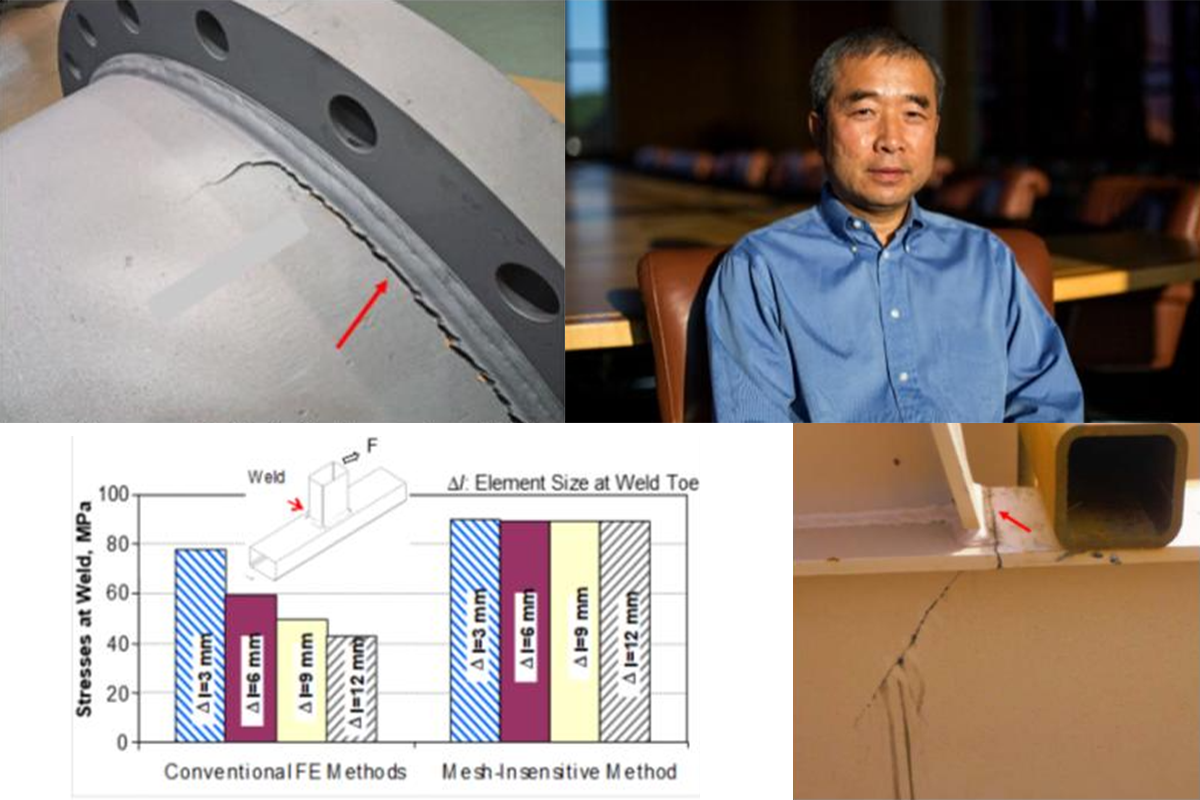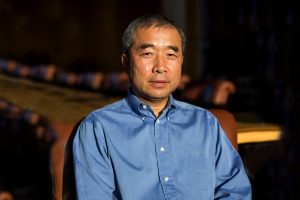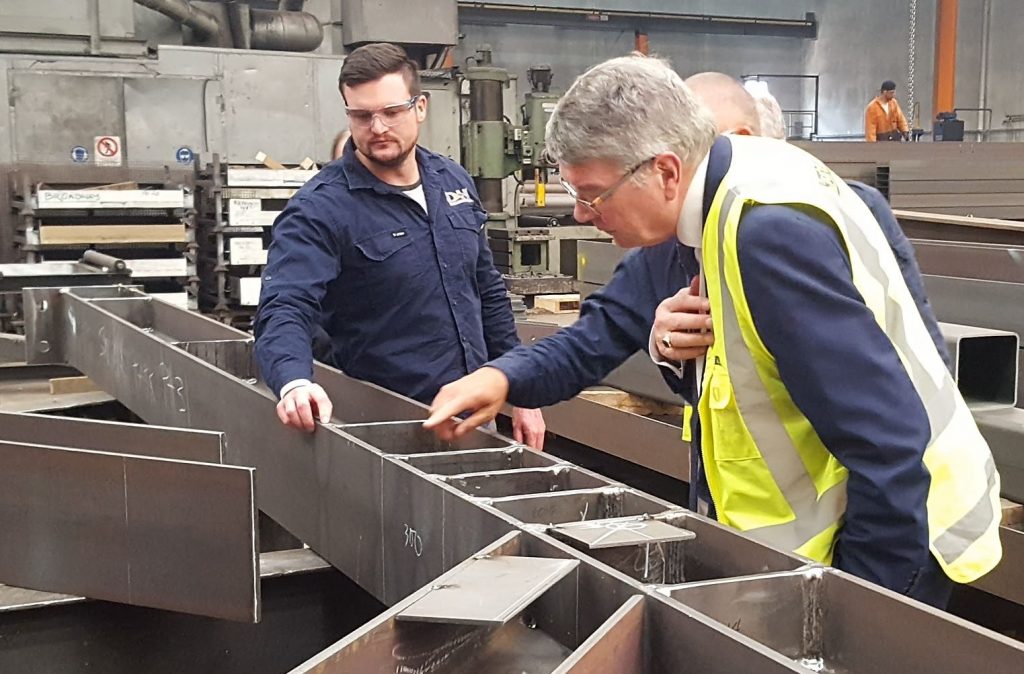
- This event has passed.
How to design Welded Structures against Fatigue Failure | Course – Auckland & Christchurch
October 10, 2023

Christchurch – Monday 9th October
Conventional fatigue design methods for welded structures are empirical, e.g., those methods based on weld classification or weld category approach originated from BS 7608. This is mainly due to the fact that stress concentration factor (SCF) cannot be reliably determined at sharp corners, e.g., at weld toe or weld root, at which stress/strain singularity exists.
As a result, SCFs can be highly sensitive not only to finite element (FE) size when using computational methods, but also to gauge size/position when using experimental techniques. This issue has been solved with the advent of the mesh-insensitive traction stress method by the course instructor over a decade ago. The method, also referred to as the master S-N (or more recently master E-N) method, has been adopted by ASME BP&V Code (Sec. VIII Div 2 Design by Analysis) since 2007 and used by over 50 countries.
This one-day short course is designed to bring professional engineers up to date on these new developments over the last two decades and their applications on how to design and fabricate welded components reliably against fatigue loading in practice. It will also cover the fundamentals of fatigue designs based on the current design codes and guidelines.
Numerous case studies will be presented throughout the course for illustrating how real-world fatigue problems can be solved with these new developments and understanding. These case studies vary from complex structural components to simple welded connections. Finally, dos and don’ts in joint design and fabrication for achieving significant fatigue performance improvement will be illustrated with simple mechanistic explanations.
————————————————————-
If you miss this course, you might want to consider the opportunity to attend Prof Dong’s two-day course in Australia:
Melbourne: 12 & 13 October and Perth: 17 & 18 October
8.30am Registration
9:00 Welcome and Introduction
Part I: Basic concepts
- Metal fatigue versus structural fatigue
- Unique issues associated with the fatigue of weldments
- Conventional fatigue evaluation procedures (e.g., BS 7608, NZS 3404, AS4100, AS/NZS 5100.6, Euro Code, IIW Guideline, etc.)
- Key assumptions and major limitations for meeting today’s Design-by-Analysis needs
Part II: How the traction stress method works?
- Mechanics basis
- Simple calculation and measurement procedures
- How to design out weld throat cracking?
- Master S-N curve and scatter band
- Validations and application examples
12:15-1.00pm Lunch
Part III: Treatment of low-cycle fatigue (i.e., plastic deformation effects)
- Structural strain method
- Master E-N curve and validations
- Treatment of extremely low cycle fatigue (e.g., seismic loading conditions)
Part IV: Does and don’ts in joint design
- Joint type selection
- Joint positioning
- Joint detailing
Q & A
5.00pm End of Course
- Designers
- Structural engineers
- Consultancy engineers
- Mechanical engineers
- Vehicle certifying engineers
- Maintenance and quality control engineers.
The seminar will be especially relevant to all professionals in steel connections, design, fabrication and maintenance. The seminar will be relevant to the following field of applications: steel structures including bridges wind turbines, transport applications, marine structures, machinery components, pressure equipment and other applications subject to high and low cycle fatigue.
Venues
Christchurch –
Commodore Hotel, 449 Memorial Avenue, Burnside
Auckland –
Novotel, 72/112 Green Lane East, Ellerslie

Prof Pingsha Dong
Prof. Pingsha Dong of University of Michigan, is the inventor of the mesh-insensitive structural stress method (also referred to as the Master S-N Curve Method) adopted by the 2007 ASME Div 2 and API 579/ASME FFS-1 Codes and Standards mandated by over 50 countries worldwide. Over the past 10 years, Prof. Dong has taught courses in fatigue design, fracture control, and residual stress/distortion control in over a dozen countries around the globe.
Prof. Dong has published more than 280 peer-reviewed papers in archive journals and major conference proceedings, including over 20 plenary/keynote lectures at major international conferences. He has received numerous prestigious national and international awards/recognitions, including AWS Comfort Adams Lecture Award (2019), AWS Fellow Award (2015), IIW Fellow Award (2014), SNAME Helmer L. Hann Awards (both in 2012 and 2007), IIW Evgeny Paton Prize (2008), R&D Magazine’s R&D 100 Award (2006), TIME Magazine’s Math Innovator (2005), Aviation Week and Space Technology’s Aerospace Laurels Award (2004), SAE Henry Ford Award (2003), AWS R.D. Thomas Award, and ASME G.E.O Widera Literature Award (2002), among many others. In addition, he is also a Fellow of ASME, AWS, and IIW.
Please fill in the registration form below to secure your spot today!
**While processing your registration – please do not refresh or leave this page**
You’ll receive confirmation once you submit your form.
If you’re still having trouble please email admin@hera.org.nz, and we’ll be happy to help.
Cancellations
The organiser reserves the right to cancel the webinars due to insufficient registrations or other reasons beyond their control, as well as altering the programme if they deem it necessary. The organisers have the right to refuse registrations.
I�m sorry � registration for this course has now closed.
We suggest you search our events section online to see if we�re holding this particular course in another location that would suit you. Alternatively, we can place you on a waitlist for the next available course.
To do so, please send an email to admin@hera.org.nz with subject title: Course waitlist request. Please include your full name, company, contact phone number, course and location you�re interested in within the email.
